Loneliness is a pervasive issue in today’s society, but it is often overlooked as a workplace problem that requires attention. Loneliness in the workplace affects businesses and leads to employee absenteeism and reduced productivity.
However, what many people fail to recognize is that specific work conditions, roles, responsibilities, and relocations can be the root causes of loneliness among working individuals. These factors may result in social isolation, strained interpersonal relationships, and hinder the development of social connections, all contributing to loneliness.
Workplace Loneliness And Its Impacts
Loneliness in the workplace is a multifaceted issue that goes beyond personal feelings. It has tangible effects on both employees and organizations.
The stresses associated with juggling work and personal life responsibilities can lead to anxiety and, in some cases, depression for working parents. The pressure to excel in their careers while taking care of their families can be overwhelming. A study published in the “Journal of Family Psychology” revealed that working parents often report higher work-related stress and a poorer work-family balance compared to those without children.
Children are highly perceptive and can pick up on their parents’ stress and emotional states. When working parents grapple with mental health challenges, it can create a turbulent home environment for their children. This emotional strain can lead to increased anxiety and hinder the child’s ability to cope with stress.
Mental health issues can strain parent-child relationships. Parents with anxiety or depression may struggle to provide emotional support and quality time for their children. This can result in feelings of neglect or emotional distance in the parent-child relationship.
Factors Contributing To Workplace Loneliness
The saying, “It is lonely at the top,” holds true for senior managers and chief executives. Their positions often distance them socially and psychologically from most of their organization. The responsibilities of making significant decisions and the lack of peers to share risks and responsibilities with contribute to their workplace loneliness.
Entrepreneurs who embark on the journey of building their own businesses often experience loneliness. In surveys conducted in 2019 and 2022 among 363 entrepreneurs in Indonesia and the United Kingdom, 50% reported experiencing loneliness. This statistic aligns with a 1984 article in the Harvard Business Review by D. E. Gumpert and D. P. Boyd titled “The Loneliness of the Small-Business Owner,” which found that 52% of business owners frequently experienced loneliness. The responsibilities of running and developing their businesses can limit the time they can spend with family and friends.
Employees relocated overseas by multinational corporations often face loneliness due to separation from their social networks. Cultural differences, language barriers, and limited social resources can make it challenging for expatriates to develop new connections in their new work location.
The advent of remote work, accelerated by the COVID-19 pandemic, has provided flexibility but has also exacerbated social isolation. Reduced opportunities for informal chats and face-to-face bonding with colleagues and managers have contributed to workplace loneliness.
While many companies are eager to see employees return to offices, the continuation of hybrid work arrangements poses challenges in addressing loneliness. Gig workers, despite enjoying flexible schedules, often have few opportunities to develop deep relationships with colleagues due to the transient nature of their work.
Strategies For Combating Workplace Loneliness
Addressing workplace loneliness requires a proactive approach by both individuals and organizations:
1. Clarify Social Goals:
Employees should understand their desired level of social goals at work, whether they prefer a few strong relationships or broad but weaker social connections. This clarity helps them identify when they need to take action to combat loneliness.
2. Self-Reflection:
Assess personal factors that may hinder social connections, such as personality traits, social skills, or motivation. Identifying weaknesses and working on them can improve social engagement.
3. Optimize Daily Resources:
Recognize that time, energy, and mood fluctuate daily. Use these resources to achieve social goals, even during moments of fatigue or low social motivation.
Strategies For Companies To Address Loneliness In The Workplace
Organizations should acknowledge that work practices can contribute to employee loneliness and find creative solutions. For example, they can reduce work intensity to allow for socialization or help expatriates maintain old social bonds while developing new connections.
Fostering an inclusive work environment is vital. It benefits demographically diverse employees and normalizes inclusion. Promoting desired social ties in the workplace can significantly reduce loneliness in the workplace. Companies can provide various opportunities for employees to interact in person, such as mentoring programs, social events, team-building activities, and coffee breaks.
Workplace loneliness is a pervasive issue with far-reaching impacts. Understanding its causes and effects is the first step in addressing this modern pandemic. By implementing the strategies outlined for both individuals and organizations, we can combat loneliness, enhance a sense of belonging, and improve overall productivity and well-being in the workplace.








